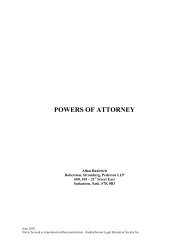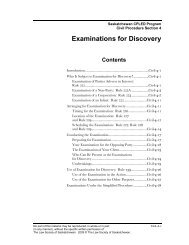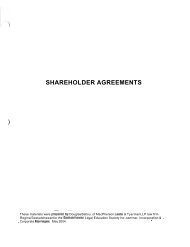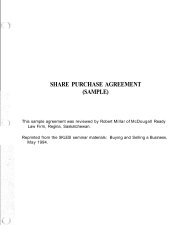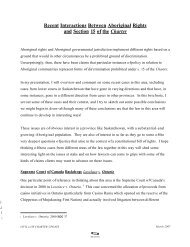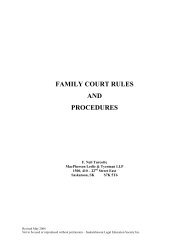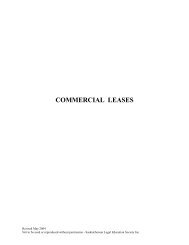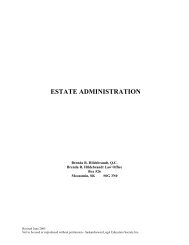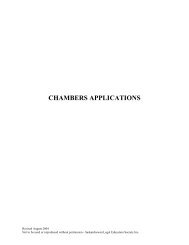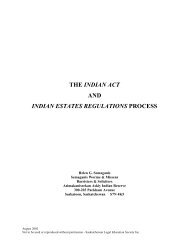Shareholder Agreements - The Law Society of Saskatchewan
Shareholder Agreements - The Law Society of Saskatchewan
Shareholder Agreements - The Law Society of Saskatchewan
You also want an ePaper? Increase the reach of your titles
YUMPU automatically turns print PDFs into web optimized ePapers that Google loves.
Corporate Commercial Section 6<br />
2009 © <strong>The</strong> <strong>Law</strong> <strong>Society</strong> <strong>of</strong> <strong>Saskatchewan</strong> <strong>Shareholder</strong> <strong>Agreements</strong><br />
Pre-emptive Rights<br />
It is <strong>of</strong>ten a surprise that absent some pre-emptive rights in a USA,<br />
shareholders do not possess a right to purchase treasury shares<br />
being issued by the corporation. Generally, USA’s provide that<br />
shareholders have a pro rata pre-emptive right to acquire new<br />
shares being issued by the corporation from treasury, thus giving<br />
shareholders the right to preserve their relative proportion <strong>of</strong> equity<br />
in the corporation. In the event that not all shareholders exercise<br />
their pre-emptive rights, some USA’s allow shareholders to take up<br />
excess shares prior to such shares being <strong>of</strong>fered to third parties.<br />
Right <strong>of</strong> First Refusal<br />
Many USA's provide that no shareholder may sell his or her shares<br />
without first <strong>of</strong>fering them to existing shareholders and/or the<br />
corporation on a pro rata basis. <strong>The</strong> general rule is that shares will<br />
only be sold to outsiders if the existing shareholders (or the<br />
corporation) are unwilling to purchase the shares <strong>of</strong> the <strong>of</strong>feror.<br />
<strong>The</strong>se provisions represent an attempt to balance the control <strong>of</strong><br />
ownership desired in closely-held corporations with the desire to<br />
provide some market or liquidity to shareholders <strong>of</strong> such<br />
corporations. However, in general, for the vast majority <strong>of</strong> private<br />
corporations, there is very little, if any, market for these shares.<br />
Mandatory Transfers<br />
Often USAs will provide for a forced or automatic sale <strong>of</strong> a<br />
shareholder’s shares in the event one <strong>of</strong> a number <strong>of</strong> listed events<br />
occur. Among the more common events include the death, disability<br />
or bankruptcy <strong>of</strong> a shareholder, the institution <strong>of</strong> matrimonial<br />
proceedings by a shareholder or the spouse <strong>of</strong> a shareholder, the<br />
finding <strong>of</strong> mental incompetency <strong>of</strong> a shareholder, or the cessation <strong>of</strong><br />
employment <strong>of</strong> a shareholder by with the corporation. Mandatory<br />
share transfers may also be triggered by a default by a shareholder in<br />
his or her obligations under the USA, such as complying with cash<br />
calls, guaranteeing debt <strong>of</strong> the corporation, or others.<br />
<strong>The</strong>se clauses <strong>of</strong>ten go into considerable detail regarding the<br />
procedure and terms for the purchase and sale <strong>of</strong> shares in these<br />
instances, and terms such as share price and payment terms may<br />
differ depending on which event triggered the mandatory sale.<br />
<strong>Saskatchewan</strong> CPLED Program<br />
Corporate–6–9



